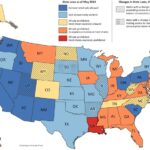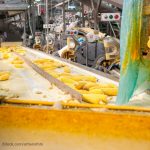The CDC says that seven pathogens cause 9.9 million illnesses every year in the United States. This estimate is used to allocate resources and prioritize interventions. The seven pathogens are Campylobacter, Clostridium perfringens, invasive Listeria monocytogenes, norovirus, Salmonella, Toxoplasma gondii, and Shiga toxin-producing E. coli (STEC). And those illnesses cause about 53,000 hospitalizations and 931 deaths. Norovirus caused the most illnesses, followed by Campylobacter, and Salmonella. Salmonella infections were the leading cause of death, with 238 every year, followed by Campylobacter with 197 deaths and norovirus with 174. The issue with this estimate is that public health reports are limited because not all people sickened by those pathogens seek medical care and … [Read more...]
One-Third of Food Outbreaks Linked to Non-Irradiated Food
One-third of food outbreaks are linked to non-irradiated foods, according to a report in the Centers for Disease Control and Prevention's Emerging Infectious Diseases report for June 2024. Those foods are eligible for irradiation treatment, which kills pathogens and extends the life of produce and other foods. Of 482 outbreaks, 155 were linked to an irradiation-eligible food; none of those foods were irradiated. Irradiation is controversial, with some significant consumer resistance and large fixed costs. The FDA has approved certain foods for this type of treatment, including poultry, fresh shell eggs, spices, and meat. The FDA says that food irradiation is safe, and can control pathogens and insects. It can reduce the use of pesticides on foods, and can preserve food for … [Read more...]
Salmonella in Raw Breaded Stuffed Chicken Is an Adulterant
Salmonella in raw breaded stuffed chicken products is an adulterant, according to a policy finalized today by the USDA. These items have been linked to many outbreaks in the United States over the last few years. The proposal was released in April 2023. These items are declared adulterated when they exceed a specific threshold (1 colony forming unit per gram or higher) for Salmonella. This is part of a broader USDA effort to reduce Salmonella illnesses associated with the raw poultry supply. Contamination in other raw poultry products will be addressed later this year. Agriculture Secretary Tom Vilsack said in a statement, "Under President Biden’s leadership, USDA is taking significant steps toward keeping American consumers safe from foodborne illness. This final determination … [Read more...]
FDA’s Annual Warning About Consuming Raw Flour
It's time for the FDA's annual warning about consuming raw flour, since the holiday season is a traditional time for a lot of baking. There have been many outbreaks linked to raw flour and products made with raw flour, such the Salmonella outbreak linked to recalled Gold Medal flour earlier this year, and the E coli outbreak linked to cake mix two years ago. Because it is dry, flour seems so innocuous. But pathogens such as Salmonella and E. coli can easily survive in low water foods. And flour is a raw agricultural product made from raw grains, which means that it can be contaminated with pathogens in the field, during harvest or transport, or during processing. The only thing that makes flour safe to eat is heat. Do not eat any uncooked cookie dough or batter. And do not make … [Read more...]
More FDA Outbreak Investigations Closed With No Answers
There are more FDA Outbreak Investigations closed with no answers, in the just updated FDA CORE Outbreak Investigation Table. So far nine outbreaks this year have ended unsolved. For the Cryptosporidium outbreak that sickened at least 11 people, the outbreak is over and the investigation has ended. The only action the FDA took in this outbreak was to conduct traceback. For the two Cyclospora outbreaks, the outbreaks are over and the investigations have closed with no answers. One of the outbreaks sickened at least 72 people, and the other sickened at least 140 people. The FDA conducted traceback and collected samples for analysis, but could not find the source of the parasite. There is a new Salmonella Thompson outbreak on the table. The product responsible for these illnesses … [Read more...]
Another Reoccurring E. coli O157:H7 Strain Linked to Leafy Greens
The CDC has identified another reoccurring E. coli O157:H7 strain that is linked to leafy greens outbreaks, according to the September issue of that agency's Emerging Infectious Diseases Dispatch. This strain is in addition to the other reoccurring strain that was mentioned by the CDC in August's Dispatch. Bacterial strains can be identified as reoccurring, emerging, or persisting (REP). Reoccurring strains repeatedly cause acute outbreaks, separated by periods when no illnesses are reported. Emerging strains are previously novel or rare strains that increasingly cause illness. And persisting strains cause illnesses consistently over a long time frame. Whole genome sequencing, which maps a pathogen's DNA, is used to find people sickened by the same bacterial strain. And WGS is … [Read more...]
Sick Restaurant Employees Cause 40% of Outbreaks
Sick restaurant employees cause 40% of foodborne illness outbreaks, according to an article in the Center for Disease Control and Prevention's (CDC) Morbidity and Mortality Weekly Report for the week of June 2, 2023. Hundreds of foodborne illness outbreaks associated with retail food establishments are reported every year to the CDC. The period of time included in this study was 2017 to 2019. In 2014, CDC launched the National Environmental Assessment Reporting System (NEARS) to compliment the surveillance conducted by the National Outbreak Reporting System (NORS). State and local health departments enter data from their outbreak investigations of retail food establishments. The data entered include characteristics of outbreaks, including factors contributing to the illnesses, … [Read more...]
FDA Issues Final Rule on Food Traceability Under FSMA
The FDA has issued the final rule on food traceability under the Food Safety and Modernization Act of 2011 (FSMA). Traceability is the ability to identify foods that may be contaminated, especially if that food is suspected as being part of an outbreak. The rule establishes traceability record keeping requirements for anyone who manufacturers, processes, packs, or holds foods that are on the Food Traceability List. Companies and people subject to this rule must maintain records containing Key Data Elements associated with specific Critical Tracking Events. They must provide information to the FDA within 24 hours or some other time frame to which the FDA has agreed. Foods that are on the Food Traceability List include: cheeses other than hard cheeses, specifically soft and … [Read more...]














